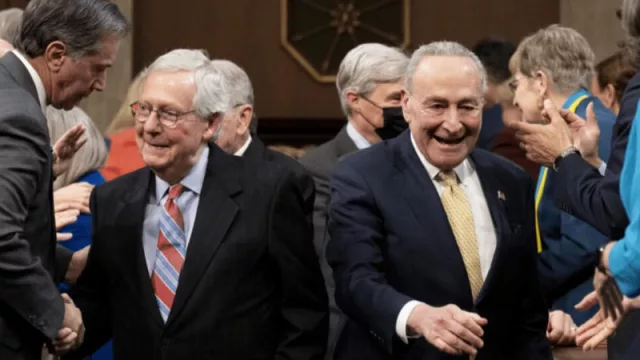In conclusion, the approval of this law by the US Congress represents a significant step in avoiding a global financial crisis caused by a US debt default. While it may have its critics and challenges, the bipartisan agreement highlights the importance of compromise and stability in safeguarding the economy. By suspending the debt ceiling and implementing spending restrictions, the law provides a temporary solution while setting the stage for future debates on fiscal responsibility and long-term debt management.
Development of the issue:
Congress approves a law to avoid a US default and ensure financial stability, bro.
The vote in Congress had solid support, with 63 votes in favor and 36 against, gaining the support of moderates from both parties who recognized the importance of avoiding the havoc that a debt default could unleash. Senate Majority Leader Chuck Schumer highlighted the significance of this measure, saying, "If we do this, there won't be a default. That's very, very important."
The approval of this law by Congress puts an end to the threat of a US default by suspending the debt ceiling and establishing restrictions on public spending until the 2024 elections. President Joe Biden plans to sign the law to avoid an economic crisis and strengthen his reputation as a pragmatic leader willing to work with both political parties. However, this agreement also faces criticism and poses political challenges for the leaders and legislators involved.
Investors, who had been worried about the risk of a US default, have received this news with relief, bro. Now their attention turns to other uncertainties, like the policy of the Federal Reserve. In the financial realm, Treasury bonds have seen a decline in Asian trading on Friday, while the stock market has continued to rise, especially in the technology sector.
President Joe Biden, who forged the agreement with House Speaker Kevin McCarthy, plans to sign the law in the coming days. This decision has political implications for both leaders, who have faced criticism from lawmakers in their respective parties who believe too many concessions were made in the negotiations.
For Biden, this approval represents a political risk as it alienates progressives, but it also avoids an economic upheaval on the eve of his re-election. It also strengthens his reputation as a pragmatic leader willing to work without partisan distinctions. The law sets the course for federal spending for the next two years and suspends the debt ceiling until January 2025, postponing a new showdown on debt until after the presidential elections.
In exchange for Republican votes in favor of the suspension, Democrats have agreed to limit federal spending for the next two years, as lawmakers have agreed to impose restrictions on public spending until the 2024 elections. This measure aims to control indebtedness and avoid a possible default on US debt.
The bipartisan agreement reached after intense negotiations includes the suspension of the debt ceiling until January 2025, postponing another showdown on debt until after the presidential elections. In exchange for Republican votes in favor of the suspension, Democrats have accepted limiting federal spending during this period.
This agreement has a significant impact on various sectors, bro. For example, young college graduates will be affected as they will have to resume student loan payments. Additionally, some low-income Americans may face benefit restrictions and service cuts.
Economists warn that short-term spending restrictions could further affect an already vulnerable economy, but they also recognize that they won't solve the unsustainable trajectory of federal debt in the long run. Estimates indicate that US federal debt could increase from 97% of GDP in 2022 to over 130% of GDP in 2033.
While this agreement avoids a global financial crisis and an imminent US debt default, both President Joe Biden and House Speaker Kevin McCarthy have faced criticism from lawmakers in their respective parties. Some believe that too many concessions were made in the negotiations.
However, despite the criticism, this agreement represents a significant achievement in averting a financial catastrophe. It provides a temporary solution to the immediate problem of the debt ceiling and ensures that the US can meet its financial obligations without defaulting. This outcome brings a sense of relief to investors and helps maintain stability in the global economy.
The law's passage demonstrates a rare moment of bipartisan cooperation in a deeply divided Washington. It serves as a reminder that, despite ideological differences, politicians can come together to address critical issues when the stakes are high. The ability to reach this compromise showcases the importance of finding common ground and prioritizing the well-being of the nation over partisan interests.
Moving forward, the law's restrictions on public spending until the 2024 elections will shape the trajectory of the federal budget. While it aims to control debt and prevent a future crisis, economists caution that the short-term spending limitations may have consequences for the already vulnerable economy. Balancing fiscal responsibility with the need for economic growth and investment will be a crucial challenge in the coming years.
As President Biden prepares to sign the law, he faces the delicate task of managing the expectations and concerns of various stakeholders. While the agreement may alienate some progressives, it also underscores his commitment to pragmatic leadership and finding common ground. The upcoming elections will test the effectiveness of this approach and its impact on his re-election prospects.












Tu opinión enriquece este artículo: